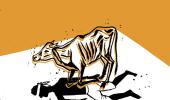It is safe to consume milk from cattle infected by Lumpy Skin Disease, which is a non-zoonotic infection and not transmissible from animals to humans, according to a senior official of Indian Veterinary Research Institute.

Lumpy Skin Disease (LSD) has spread in more than a dozen states including Gujarat, Rajasthan, Punjab and Haryana.
The disease has affected 16.42 lakh cattle in 197 districts and has killed 75,000 cattle between July and September 11, 2022, according to data maintained by the Department of Animal Husbandry.
LSD is a contagious viral disease that affects cattle and causes fever, nodules on the skin and can also lead to death. The disease gets spread by mosquitoes, flies, lice, and wasps by direct contact among the cattle, and through contaminated food and water.
Speaking to PTI, on safety and quality of milk from the infected cattle, IVRI Joint Director Ashok Kumr Mohanty said LSD is a non-zoonotic disease and not transmissible from animals to humans.
"It is safe to consume milk from the infected cattle. There is no problem in the quality of milk even if you have it after boiling or without boiling," Mohanty said.
However, milk production in the infected cattle gets affected depending on the severity of the disease and immunity level of the animal, he added.
Mohanty said there can be a localised impact on milk production but it is difficult to quantify right now in the absence of accurate data on the spread of the infection in cattle across the country.
"When cattle are infected, the animals become weak due to nodule formation, fever and other symptoms. This severely affects milk production. When the animal is dying, its entire body system is affected," he said.
The disease and its impact on milk output can be arrested if cattle are vaccinated on time. If cattle are infected for the first time and not vaccinated, then milk production can get reduced up to 40-50 per cent, he added.
On vaccination, Mohanty said till now, states are using 'goat pox' vaccine to control the spread of LSD even though a new vaccine has been developed and is expected shortly after regulatory approvals.
Elaborating further, Amit Kumar -- a scientist at IVRI working on the goat pox vaccine -- said this vaccine is effective in controlling the spread of LSD in cattle.
The goat pox vaccine doses were given to LSD infected cattle in the Eastern and Southern states in the last two years. LSD has been contained in those states and it has not resurfaced this year, he said.
"LSD has gone severe this year in 4-5 states of Western India because goat pox vaccine doses were not administered," Kumar said.
Indian Immunologicals Ltd (IIL), a subsidiary of National Dairy Development Board that manufactures animal and human vaccines, and Hester Biosciences are two companies which are manufacturing goat pox vaccine and there is enough supply, he said.
On the new vaccine, Mohanty said it has been developed by two institutes of agri-research body Indian Council of Agricultural Research (ICAR) recently. ICAR has contacted five companies for commercialisation of this vaccine.
IVRI, an ICAR institute based out of Mukteshwar in Uttarakhand, does research on animal viruses and viral diseases of livestock and poultry. It also has a mandate of production of antigens, diagnostic sera, vaccines, etc besides conducting epi-zootiological and pathological studies on viral diseases.











 © 2025
© 2025